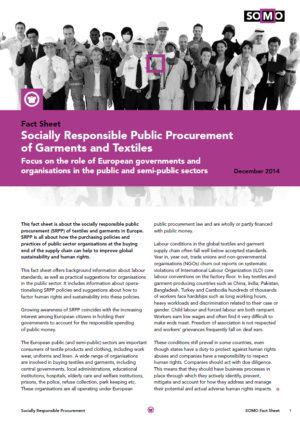
Fact Sheet: Socially Responsible Public Procurement of Garments and Textiles
Focus on the role of European governments and organisations in the public and semi-public sectors
This fact sheet is the fourth in a series about labour conditions in the textile and garment industry. This one is about the socially responsible public procurement (SRPP) of textiles and garments, especially in Europe. SRPP is all about how the purchasing policies and practices of public and semi-public organisations at the buying end of the supply chain can help to improve global sustainability and human rights.
This fact sheet is made for the Wellmade project. Wellmade is a collaboration between the Fair Wear Foundation, Dutch trade union CNV, Christian Initiative Romero, Ethical Trading Initiative, and SOMO. Wellmade aims to gives brands and retailers in the garments and textiles sector, as well as governments insight into the labour problems that exist within their supply chains. Wellmade offers informs about steps to make supply chains a better place to work.Background information about labour standards as well as practical suggestions for purchasing organisations can be found in this fact sheet. Also, suggestions on how to issue human rights and sustainability into the SRPP policies and practices of SRPP are included.
Labour conditions in the global textiles and garments supply chain often fall well below accepted standards. Year in, year out, trade unions and non-governmental organisations (NGOs) churn out reports on systematic violations of International Labour Organization (ILO) core labour conventions on the factory floor. Hundreds of thousands of workers face hardships such as long working hours, heavy workloads and discrimination related to gender or caste. Child labour and forced labour are rampant. Workers earn low wages and often find it very difficult to make ends meet. Freedom of association is not respected and workers grievances frequently fall on deaf ears.
Even though states have a duty to protect against human rights abuse and companies should act with due diligence, in some countries these conditions still prevail. Additional and innovative strategies to help improve the situation for workers and the communities are needed. Public procurement on the basis of stringent social criteria is one way forward. Together European public and semi-public buyers of textiles and garments have considerable purchasing power. If these organisations join forces they can create significant leverage in the supply chain to improve labour conditions in the textile and garment manufacturing industries in the global south. The factsheet provides an inspiring overview of interesting practices in SRPP, with examples from the Netherlands, Norway, and the US.
Partners
Publication
-
Download: Fact Sheet: Socially Responsible Public Procurement of Garments and Textiles (pdf, 384.97 KB)
Related content
-
 Socially responsible public procurement of garments and textiles in EuropePosted in category:NewsPublished on:
Socially responsible public procurement of garments and textiles in EuropePosted in category:NewsPublished on: -
 Gisela ten KatePosted in category:Publication
Gisela ten KatePosted in category:Publication Gisela ten Kate
Gisela ten Kate
-
 Dutch national policy for socially responsible public procurementPosted in category:NewsPublished on:
Dutch national policy for socially responsible public procurementPosted in category:NewsPublished on:


